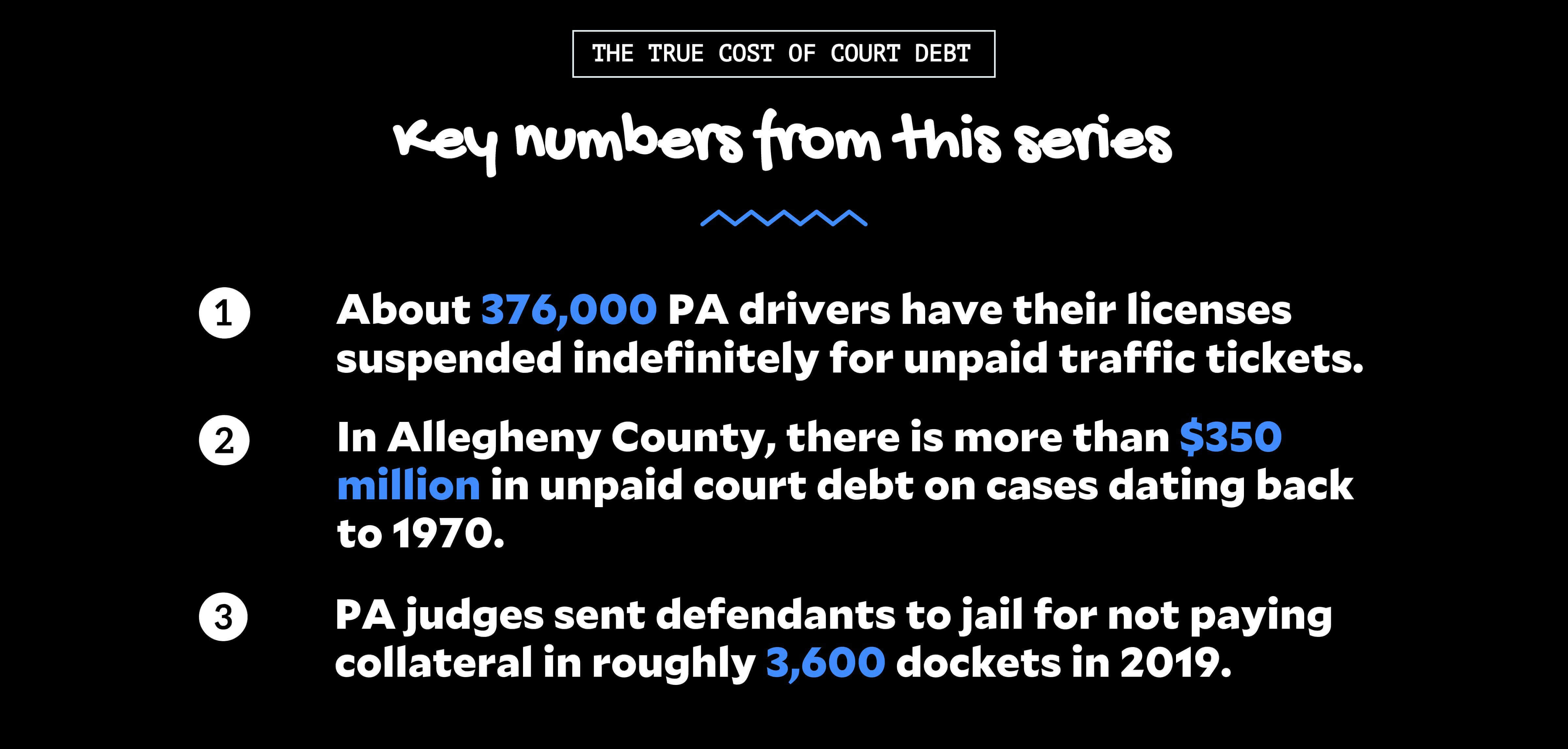February 27, 2020
How not paying court fines and costs can mean jail time
By Juliette Rihl

February 27, 2020
By Juliette Rihl

February 27, 2020
By Juliette Rihl

Stories about how court fines and fees deepen poverty and entangle people in the legal system.
In July, a 27-year-old man spent three nights in Allegheny County Jail for not posting collateral on five traffic tickets for driving without a license after it had been suspended because he didn’t pay traffic tickets or appear in court. The judge’s reason for jailing him was that he could pay because he was employed full time.
A 58-year-old man spent three nights in jail in March for failing to post collateral on three counts of driving with a DUI-suspended license. For the man to be released, the judge documented that he would need to post the $300 collateral.
In October, a 31-year-old woman spent four nights in jail for not posting collateral on three traffic tickets — two for illegal parking on a street sweeping day and one for driving on a suspended license from failure to pay traffic tickets or appear in court. The judge in her case also noted that she was employed.

Jailing defendants for their inability to pay has long been illegal. But courts, including in Allegheny County, still jail defendants who don’t pay if the court decides that they have the means.
In 2019, there were roughly 3,600 court dockets in Pennsylvania where people were jailed for not paying collateral, according to data from the Administration Office of Pennsylvania Courts [AOPC] shared with PublicSource by the American Civil Liberties Union of Pennsylvania [ACLU-PA]. Of those, about 160 dockets are from Allegheny County.
The heart of the issue: In 1973, the Pennsylvania Supreme Court ruled that jailing indigent defendants for nonpayment was unconstitutional. In 1983, the federal Supreme Court made the same ruling. Yet across the state and the country, from Missouri to Texas and New York, people are still being jailed for failure to pay their court fines and costs.
If a person is found to be indigent, they cannot legally be penalized for nonpayment. However, judges still jail defendants if they miss a payment, the court brings them in on an arrest warrant and they don’t post collateral. Or, they can be jailed if the judge finds that the defendant has the ability to pay their fines and fees but is willfully choosing not to.
Magisterial District Judge Beth Mills of Elizabeth Township is among the Allegheny County judges who have jailed defendants for failure to post collateral. She said the purpose is to ensure defendants appear in court. “It’s mostly for people who have shown lack of respect to the court in the past, and I have a belief that they’re not going to show up for their hearing,” she said. “I’m not sending anybody to jail because they’re poor. I’m sending somebody to jail because they have not paid their payment plan for the last five or six times, and that’s after determining they have the ability to pay.”
Because there are no guidelines in the state statutes or Pennsylvania Rules of Criminal Procedure for how judges determine a defendant’s ability to pay, it is largely up to a judge’s discretion. Some critics argue that judges are determining defendants have the ability to pay when they actually don’t.
“In my experience, judges almost always violate the law when using this process,” Andrew Christy, criminal justice and poverty attorney for ACLU-PA, said. “There’s also a fundamental question of whether it is ever constitutionally appropriate to use it.”
According to Pittsburgh Magisterial District Judge Richard King, it is rare that someone is sentenced to jail only for fines and costs. “No one is going to jail because they’re poor, can’t afford it, and the judge is totally ignoring that fact and is putting them in jail anyway,” he said.
How it works: In Pennsylvania, there are two ways a person can be jailed by district courts for not paying court fines.
The scope: Some local judges jail defendants for failure to post collateral more often than others. Of the 163 dockets in Allegheny County from Jan. 1, 2019 to Dec. 15, 2019, 39 were under Judge Richard King in Pittsburgh (totaling 7 defendants), 26 were under Judge Carolyn Bengel in Brackenridge (totaling 6 defendants) and 24 were under Judge Jesse Cramer in Coraopolis (totaling 5 defendants).
"Jailing people for failure to pay fines and costs, if we have to come to that point, we’ve all lost,” King said, referencing the cost to jail defendants. Housing someone in jail requires taxpayer money — around $75 per day in 2012 — while the fine and fee revenue is still not collected. “It’s counter-productive to have to use jail, but sometimes jail is necessary when all else fails,” King said.
Bengel declined to comment on the data through her secretary. Cramer, who rotates courts, could not be reached for comment after contacting the offices of four courts in which he presides.
Judges are required to state why a defendant was jailed for failure to post collateral. Among the reasons listed in the AOPC data for Allegheny County: “stopped making payments,” “failure to pay” and “per judge.”
In several cases across the state, including in Allegheny County, judges included that defendants received welfare benefits like Supplemental Security Income [SSI] or were homeless.
According to David Harris, professor in the University of Pittsburgh School of Law, those reasons alone are not substantial enough to warrant jail time. “Maybe it was true that the people had the ability to pay and were refusing, but those reasons as given don’t necessarily show that,” he said.

Magisterial District Judge Beth Mills of Elizabeth Township. (Photo by Jay Manning/PublicSource)
While a court docket indicates if a defendant was given jail time compensation, it does not specify if the reason they were initially jailed is for unpaid fines and fees, or if the judge gave them compensation toward their fines and fees for a separate sentence already being served.
Because court dockets don’t say why jail time compensation is used, Christy of the ACLU said, it is impossible to tell how many people are jailed for failure to pay. He said he believes the number of people jailed under jail time compensation statewide is even higher than the number of people jailed for failure to post collateral. “It’s pretty easy to conclude we’re talking about multiple thousands of people just at the [Magisterial District Judge] level,” he said.
Mills said she often employs jail time compensation. She said in her court, it is split between people who are already serving a separate sentence and people who aren’t. “You do have people who come in who want to plead guilty and just be done with it by going to jail,” she said.
Magisterial District Judge Bruce Boni of McKees Rocks said that in his two years on the bench, defendants have asked once or twice if they could receive jail time compensation for unpaid fines and fees. “I’ve had people say ‘Your honor, I don’t have the money to pay this. Can I just serve the time?’” he said. “That’s an uncomfortable position to be in.” He said he talked the defendants out of it.
Harris noted that jail time can cause people to lose their jobs, living situations and custody of their children. “Even a short jail stay is really damaging to anybody who is living on the margins,” he said.
Update (3/3/2020): This story was updated to include comment from Judge Richard King.
Juliette Rihl is a reporter for PublicSource. Juliette is a Justice Reporting Fellow for the 2019 John Jay Fellowship on “Cash Register Justice.” She can be reached at juliette@publicsource.org.
Photos by PublicSource Visuals Producer Jay Manning. The lead photo is of the Allegheny County Jail.
This story was fact-checked by Matt Maielli.